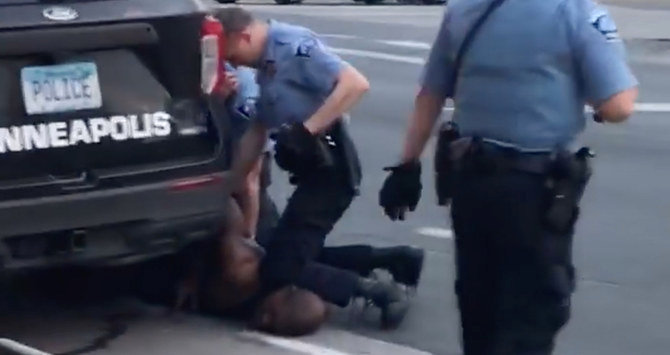LIVERPOOL, England: For Liverpool’s biggest mosque, it’s been a week of firsts.
Most entrances have been blocked, men in high-vis jackets have been taking turns to patrol and a handful of worshippers have been sleeping inside at night — all necessary precautions, say officials at the Al-Rahma Mosque, during the UK’s worst riots in years.
The increased vigilance comes as some Muslims and ethnic minorities in Liverpool say they feel unsafe amid widespread violent, racist protests targeting mosques, immigration centers and hotels that haven’t spared the famously left-leaning city in the north of England.
Both mosque officials and other Muslims in Liverpool described feeling shocked, after two mosques further north in England were targeted by violent mobs and hundreds of anti-immigration protesters and counterprotesters clashed in central
Liverpool. Shops were looted and some police were injured.
A second mosque in Liverpool, the Abdullah Quilliam, which describes itself as Britain’s first, has temporarily closed due to the violence, which was fueled by a false narrative spread online that the killer of three girls in nearby Southport last week was an Islamist migrant.
“I was born here, I was raised here. So seeing this, it just doesn’t feel like home,” said Abdulwase Sufian, a 20-year-old student who helps at the Al-Rahma, referring to himself as a “Scouser,” the colloquial term for someone from Liverpool.
“Seeing what’s happened, it’s gotten me scared, not just for myself, but for the future,” he said, the yellow dome and pink-and-yellow minarets of the Al-Rahma behind him as dozens of men finished afternoon prayers and left.
Sufian added that the separate female entrance for the mosque, which serves a wide range of Muslims from ethnic Yemeni to Pakistani, had been closed to discourage women from visiting in the evenings, out of safety concerns.
He himself hasn’t stepped outside his immediate neighborhood out of fears for his safety, Sufian said, a sentiment echoed by others in the community.
FEELING TERRIFIED
Saba Ahmed, a community worker and another Liverpudlian Muslim, said she had felt “terrified” in recent days, and her 15-year-old son was preferring to spend his summer holidays indoors on his PlayStation.
Still, many of Ahmed’s white English friends had been supportive, she said, with some neighbors offering to do the grocery shopping for her so she could remain safe at home.
“That’s our people in Liverpool, that’s our fellow neighbors here,” she said.
Others have been less fortunate.
Farmanullah Nasiri, a taxi driver, described being assaulted after picking up two passengers from Aigburth Road, Liverpool, in the early hours of Tuesday.
One of them, a woman, punched him on the face and broke his dashcam as she left his silver Ford Focus, after starting an argument over the fare and after abusing him once she learnt he was an ethnic Afghan, Nasiri said.
Nasiri, 28, says he did not file a police complaint.
A video shot at 0120 GMT on his iPhone showed a broken dashcam and blood above his right eye. Reuters was not able to verify his account of how it happened.
“This is kind of a racism ... Been here for more than 10 years in Liverpool. Everybody’s friendly. There’s no issue like this before. This is the first time,” Nasiri said.
Tell MAMA, a group which monitors anti-Muslim incidents, has received over 500 calls and online reports of anti-Muslim behavior from across the UK in the past week, a five-fold increase from the week before, its director Iman Atta told Reuters, describing Muslim communities as “terrorized.”
Anti-Muslim hate has been growing in the UK even before the start of the riots, and particularly after the start of the conflict in Gaza last year, the group says.
Over one in four in a survey of 550 British Muslims last month said they had faced an anti-Muslim hate incident in the last year, Tell MAMA said.
‘NOT JUST MUSLIMS’
Amid all the tension, Muslim community leaders are advising calm, at a time when many young men in the community might feel tempted to respond.
Footage from Sky News earlier this week showed a large group of mostly Asian men with Palestinian flags gathering in an area of Birmingham following rumors of a far-right protest at the site, which did not materialize. Police said a man was assaulted and a pub window was smashed, and have charged one man for possession of an offensive weapon.
The rival, counter protests have included both White and non-White people describing themselves as anti-racist, anti-fascist or pro-Palestinian. Sometimes extreme left-wing anarchists have also taken part.
Community leaders are discouraging such gatherings.
“We don’t want these counter protests or these large groups of young people turning up because that’s the spark that we don’t need ... so we need to be very careful,” said Sajjad Amin, trustee of the UKIM Khizra Mosque in Manchester, 30 miles (50 km) from Liverpool.
Some Muslim leaders recounted tensions being defused.
Adam Kelwick, an imam at the temporarily-closed Abdullah Quilliam mosque, said it had been “prepared for the worst” when anti-immigration demonstrators gathered outside last week, but protesters calmed down after offers of food and dialogue.
“All it took was a few burgers and some chips and some genuine intention from our side,” he said, speaking from near the chained up gates of the Victorian-era mosque.
The Muslim population in England and Wales stood at 3.9 million people, or 6.5 percent of the total, as of 2021.
The heightened tension has unnerved both that community and others. On Tuesday evening rumors of a far-right gathering prompted shops on Lawrence Road to down their shutters early.
Local resident Santhosh Thomas, an ethnic Indian, helped chain up two large metal road signs to the fence of a nearby church, to discourage their use as weapons.
He said his brown skin made him a target, regardless of his religion. “It’s not just Muslims ... everyone is scared,” Thomas said, as a police van arrived on Lawrence Road.




























